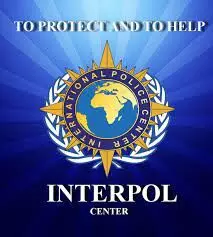- Home
- /
- Trending-News
- /
- Interpol unveils...
Interpol unveils silver notices against money laundering

The International Police Organisation (INTERPOL) has unveiled a new module codenamed Silver Notices to frontally tackle the scourge of money laundering and illicit financial flows across the world, especially Africa.
The Interpol Vice President for Africa, Garba Umar, said this on Monday while declaring open a four-day training workshop for Nigerian law enforcement agencies at the EFCC Academy in Abuja.
According to Umar, money laundering across Africa and the entire world has assumed a monstrous dimension, and Interpol has designed Silver Notices to combat the menace.
“Evidence has shown that every hour, hundreds of thousands of dollars are flowing out of Nigeria to the region and across the world, laundered before it reaches the pockets of criminals to enjoy the profits of their crimes, while the hardworking and honest Nigerians pay the price of crime.
“With every successful laundering of criminal money, our country becomes more prone to crime.
“More drugs, more fraud, more corruption, and more violence. Every time criminal money is successfully laundered, our financial institutions take an additional blow,” he said.
He stressed that hard times awaited money launderers as the Silver Notices would make illicit funds more difficult to launder in any part of the world.
Umar spoke on the theme of the workshop, “Strengthening Capacity and Coordination Against Financial Crimes.”.
He pointed out that financial crimes have become transnational, and law enforcement agencies needed regular training for their workforce to be ahead of fraudsters.
He urged all participants at the workshop to take collabouration with other law enforcement agencies seriously to advance their investigations and ensure that criminals did not get to enjoy the fruits of their labour.
“The only way we can move forward as a country is by working together and identifying common problems, jointly devising solutions, and taking coordinated and cohesive action.
“And now is the time that we need to go far by going together,” he said.
The Chairman of the EFCC, Mr. Ola Olukoyede, in his goodwill message also harped on the need for enhanced collaboration in tackling financial crimes.
Olukoyede stressed that the complex nature of corruption across the world could only be broken by the might of collaborative actions by every stakeholder.
“The daunting nature of the fight against corruption in Nigeria and the world at large deserves serious collaboration among organisations saddled with the responsibility of fighting corruption,” he said.
Olukoyede was represented by the Director, Fraud Risk Assessment and Control, FRAC, of the EFCC, Mr. Francis Usani.
He appraised the pivotal role of the EFCC in tackling corrupt practices, especially its impressive records of convictions and recoveries.
He expressed optimism that, with the new emphasis on preventive frameworks in tackling financial crimes by the commission, greater progress would be made.
“Our records of convictions and recoveries stand us out, but we will not rest on our oars; we are committed to doing more.
“And in this commitment, the EFCC is re-strategizing its operations with a focus on prevention, knowing that it is easier and cheaper to prevent corruption from happening than to investigate and prosecute corruption,” he said.
In his remarks, Ambassador Extraordinary and Plenipotentiary of Japan to Nigeria, Mr. Kazuyoshi Matsunaga, described the workshop as an important joint initiative between Japan and Nigeria to combat financial crimes.
He explained that in the contemporary globalised world, financial crimes transcended borders and required international cooperation among law enforcement agencies to combat them.
“I am delighted that INTERPOL and the Japanese National Police Agency are an integral part of this project, contributing their expertise.
“A remarkable collaboration took place three years ago when Japanese and Nigerian law enforcement agencies successfully returned a fund to a Japanese fraud victim, earning immense gratitude.
“Strengthening our partnership through this project will benefit not only Nigerians but people around the world, including the Japanese,” he said.
Hafsat Bakare, Director-General and Chief Executive Officer, Nigerian Financial Intelligence Unit (NFIU), spoke about the imperative of strengthening capacity and coordination against financial crimes.
She pointed out that “financial intelligence and financial analysis techniques are key to tackling economic crimes.”.
The NFIU, she said, was sensitive to the interconnected nature of the criminal justice system, the threat of organised crime, and cybercrimes being fought by law enforcement agencies.
Isaac Oginni, Director of Interpol’s Financial Crime and Anti-Corruption Centre, IFCACC, said the only way to disrupt organised crimes was by denying fraudsters the financial profit behind their criminal enterprise.
“Besides, financial intelligence can also be well utilised when investigators recognise its value and use it to build a financial profile around suspects.”
He challenged participants and stakeholders at the workshop to collectively work together and fight money laundering.
The four-day workshop, the first of its kind and hosted by the EFCC, was organised by INTERPOL and the Japan International Cooperation Agency (JICA).
It drew participants from the police, EFCC, NFIU, the Nigerian Immigration Service, and the Nigeria Customs Service.




